Our anti-racist commitments as of Spring 2024
4 Mar 2024
Welcome to our biannual bulletin on SSE’s action against racism. This update details our efforts to share power, wealth and opportunity more equally, both within our organisation and throughout our learning programmes.
Issues of equity, diversity, and inclusion sit at the heart of SSE’s mission with an aim to empower and equip those with entrepreneurial ideas with the skills required to grow the social economy.
In this report, we have taken a deep dive into our work around student diversity, as this was an area we flagged in our last anti-racist commitments update as an indicator we wanted to focus our attention on.
We will need to delve into a greater level of analysis over a prolonged period of time, in order to ascertain whether or not these positive trends will maintain over time.
If you think we could be doing more to become truly inclusive and equitable, please let us know by mailing [email protected], using “FAO EDI lead” as the subject line or top of your email.
1. Keep learning and challenging ourselves to be anti-racist.
Our commitment: We will analyse, reflect, learn and challenge ourselves, and our community, to be anti-racist both now, and on an ongoing basis.
Measuring progress:
Indicators 1 and 2: Update on action plan for 2023-4 and actions and target outcomes published as part of new three-year strategy.
We refreshed our EDI roadmap for 2023-24 with three new priorities under our ‘EDI hustlers’ mandate, as follows:
- Work in partnership with EDI led funding partners, to ensure even greater reach into EDI communities. Share outcomes and encourage this approach to influence the sector.
– By working with Voice 4 Change England, the national membership organisation for the Black and Minority Ethnic voluntary and community sector, we’ve been supported in redesigning and improving our application and enrolment processes for our students.
This includes, as previously mentioned, a ‘360-degree Review’ of SSE’s data model and data protocol, advice on making our application form more accessible, expert analysis on our recruitment materials and a guided workshop on EDI standards.
Through these recommendations, we have begun to implement changes to our outreach and assessment.
- Recognise primary and secondary lived experience of EDI factors in student applicants, where relevant to the impact they aim to achieve.
– We seek to attract diverse led organisations to our programmes and believe that lived experience of EDI factors enables entrepreneurs to strengthen their impact and potential to create sustainable change.
If the applicant is comfortable to do so, we discuss how the social entrepreneurs lived experience is relevant to the purpose of their social enterprise at interview stage. However, we recognise sharing lived experience can be distressing and so we ensure there is never any pressure to do so.
- Bring our SSE fellows into our grant-making process, ensuring that their lived experience is reflected in our decision-making.
– At each of our grant panels, SSE fellows are key to the decision-making process. There is always at least one fellow as part of the panel. The decision-making process involves each grant panel member reviewing the assessment documentation prior to the panel and then making recommendations to decide which applicants are offered places on the programme.
- Our EDI working group continues to meet monthly in order to champion EDI goals and cascade information throughout the team.
- We have embedded other priorities from the original 10-year EDI roadmap into our operational planning, ensuring that EDI is consistently championed throughout the organisation.
- The 2024-5 goals are currently being agreed and will be published in our next update. We will be reviewing all indicators to ensure they accurately capture the change we want to make as an organisation and to align our work processes and goals accordingly.
2. Diversify our staff team, senior leadership, and board
Our commitment: We will increase the representation of people from Black and other racialised and minoritised communities* in our staff team, particularly at senior level and among the trustee board. We will publicly set and report on diversity indicators.
Measuring progress:
Indicator 3: Diversity of staff team, including at senior level.
- Our 2023 staff survey results remain the same as our previous update. We collect EDI staff data on an annual basis and will share an update on this in the next update.
- Results showed that 22% of staff at SSE are from Black and minoritised ethnic backgrounds, compared with 18% in the 2021 staff survey.
- 20% of our SMT (1 of 5) describe their backgrounds as black or minoritised.
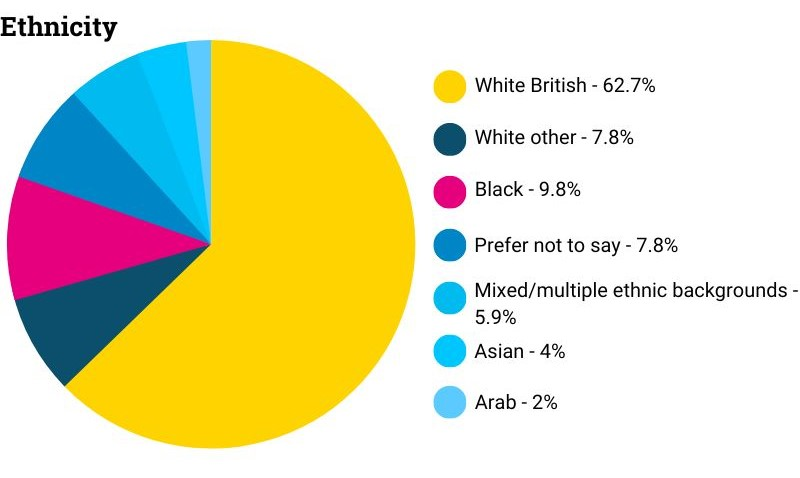
added from recent TAR.
Indicator 4: Diversity of our trustee board
This remains unchanged as we collect our Trustee data once a year. This will be published in our next report in Spring 2024.
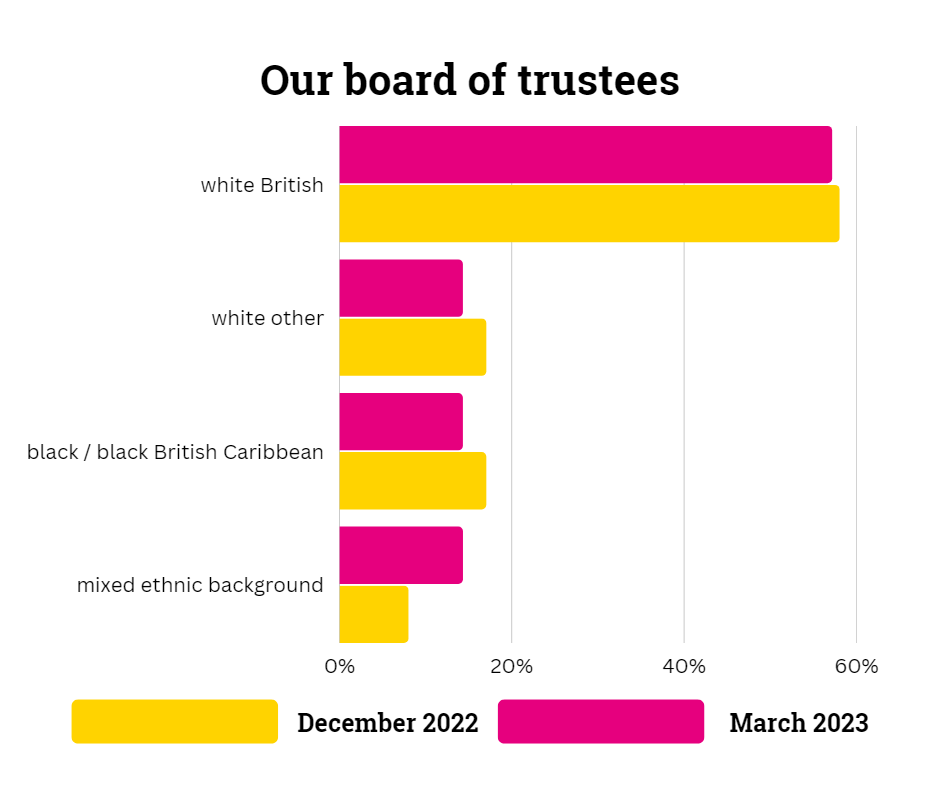
3. Diversify our programmes (people and content)
Our commitment: We will increase the racial and ethnic diversity of participants on our programmes at all stages, from pre-start to scale, as well as provide targeted programmes of support for people from Black and other racialised and minoritised communities. We will make our programmes more inclusive to achieve this, in particular, by improving our recruitment and selection processes and by diversifying our delivery team (e.g. assessors, speakers and facilitators).
Measuring progress:
Indicator 5: Diversity of student population.
Is our current enrolment of our students equitable in terms of ethnicity?
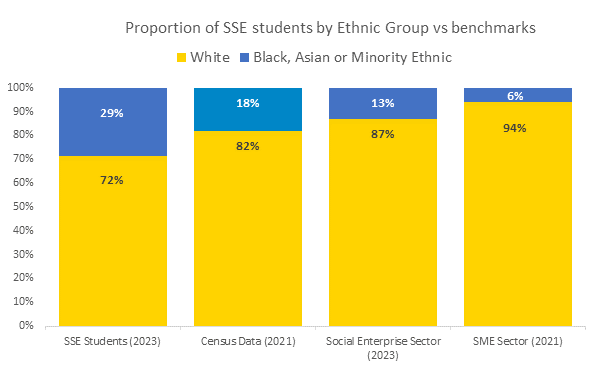
In 2023, 29% of our enrolled students were Black, Asia or Minority Ethnic. This exceeds the population statistics (18%), the social enterprise sector (13%) and the SME sector (6%).
On the aggregate it is positive that we exceed all benchmarks and for 2024, the figure is equal to the 2023 stats (29%). To understand further, we need to disaggregate the data, look at the trends over time and compare them to application statistics.
What has happened over time and does the enrolled trend follow the trend of number of applications?
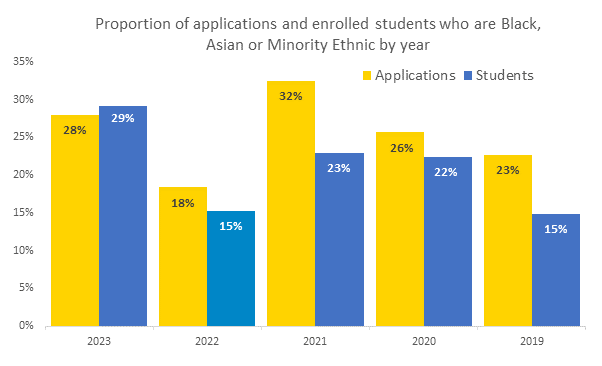
The proportion of enrolled students who are Black, Asian or Minority Ethnic has increased since 2019 (with a slight dip in 2022). The trend in the number of applications is less clear and there has been a lot of variation over the last 5 years.
In 2023, the proportion of enrolled students who are Black, Asian or Minority Ethnic (29%) is broadly in-line with applications (28%), with just 1 percentage point difference. However, in the previous years the proportion has been higher for applications than for students, suggesting a higher success rate for White social entrepreneurs. The reduction in this gap in 2023 is positive but it is still helpful to understand the previous gap to ensure it does not happen again.
These latest figures show as an organisation we are improving our ability to attract and enrol social entrepreneurs from minority ethnic communities on our programmes in 2023 which is pleasing to see. There also are noticeable improvements in the difference between the proportion of social entrepreneur who are Black, Asian or minority ethnic at application stage vs enrolment stage in 2023 – it is not clear if this will hold for 2024 and beyond. Further analysis is needed to understand the drivers for this which we will conduct looking at the data according to place, organisation size and theme.
Indicator 6: Diversity of entrepreneurship delivery team (assessors, speakers, facilitators).
The diversity of our EDS team can be found below. This is the same as our previous report as we only collect EDI staff data once a year.
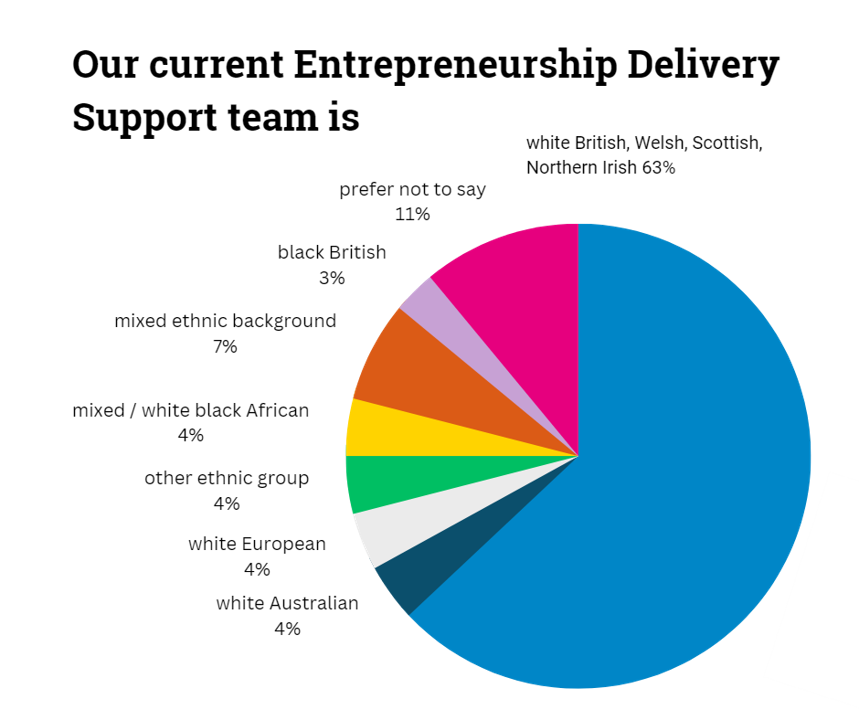
We are conscious our delivery team also includes freelancers who are not reflected in the figures above. We will implement a process for capturing this data on all new freelancers providing they give us permission to do so from 2024/5.
After thorough investigation it was determined that capturing EDI information for suppliers is too complex given the size of the organisation of some of our suppliers and would be too resource intensive for an organisation of SSEs size.
Indicator 7: At least two targeted programmes for people from racialised and minoritised backgrounds established by end of the financial year.
- We are currently part-way through our 3-year partnership with PwC, which commenced in January 2022.
- We have already delivered the first year of programmes, supporting 15 black social entrepreneurs in total, as well as hosting a graduation for participants, pictured below.
- We will deliver 1x Start Up Programme in Scotland and 1x PwC black Social Entrepreneurs Programme in England per year, for the next two years.
- We have delivered our Black Social Entrepreneurs Futures programme with Gowling WLG
In the coming year, we aim to identify key themes within local communities, such as the cost of living crisis and ‘levelling up’, climate action and diversity, female entrepreneurship, and prospects for young people. These will form the basis of a refreshed indicator in the next update.
Indicator 8: Multi-stakeholder learning captured, shared internally and externally, and used to inform future action.
- Our evaluation into our flagship last 5 years of our Lloyds Bank and Bank of Scotland programme supporting over 1200 students showed 22% of our programme participants were from minority ethnic communities compared to the 6% from the SME sector and 18% from the national population.
- To disseminate our findings, we hosted an event in Parliament which also gave us an opportunity to have one of our students Our Version Media who specialise in championing the voices of black and minority ethnic communities speak about their experience on the programme and the change in EDI needed across the wider social infrastructure sector.
Read more in the latter part of this article: Social enterprises supported by SSE more likely to survive first two years than other small businesses, research shows | The Social Enterprise Magazine – Pioneers Post - A new format is being launched around our staff EDI working group which allows for greater accountability, advocacy and support. Each department director will be invited to spotlight on their EDI objectives to the group to get feedback and support.
4. Influence our supply chain and funders
Our commitment: We will increase diversity in our supply chain and promote and influence funder action on anti-racism, through who we work with and how we engage. This means working with funders and supporters who are willing to work alongside us to continue to learn and develop their practice to be anti-racist.
Measuring progress:
Indicator 9: Increase in the number and value of supplier contracts held by people from Black and other racialised and minoritised communities in our supply chain.
- After thorough investigation it was determined that capturing EDI information for suppliers is too complex given the size of the organisation of some of our suppliers and would be too resource intensive for an organisation of SSEs size.
- However, our procurement policy and process will be updated to include that where two or more suppliers score equally, that priority is given to suppliers from diverse backgrounds and under represented groups where this information in known.
Indicator 10: We have assessed the commitment to anti-racism of all pre-existing funders and supporters, as well as setting out a plan for future decisions regarding new opportunities.
- As we grow our programmes in the next few years, we are working in collaboration with V4CE to upskill and train their team in the use of Match Trading grants. This will enable us to dramatically increase the proportion of incentivised grants that encourage trading that reaches Black and Minoritised communities.
- This forms part of our wider EDI hustler mandate to ensure we shift innovation and power into the hands of Black and Minority-led organisations and we are excited to work deeply with V4CE over the next 5 years on this. Full specific details will be announced in our next update.
- As part of our wider sector role, we are pleased to be championing the need for EDI to be considered and part of the design of effective Enterprise Grantmaking. This is through our role on the steering group of the Enterprise Grants Task Force
What’s next?
We’ll continue to update on our commitments twice a year. As we have been doing our anti-racist reporting since 2021.
We will be conducting a review and refreshing our indicators to make sure they are relevant and useful in driving change and sparking action across the organisation.
We welcome feedback and ideas from our Fellows, learners, and funder community. Together we can make a difference.
(*We know that language about identity is personal, and these terms won’t feel right to everyone. We mean people who may identify as Black, Brown, bi- or multi-racial, being from a diaspora, having Asian/African/Caribbean/Latinx/Middle Eastern/Indigenous heritage, as a “person of colour”, Jewish, and/or from a white ethnic minority such as Gypsy, Roma, Traveller. We have consulted our community to shape this language.)
